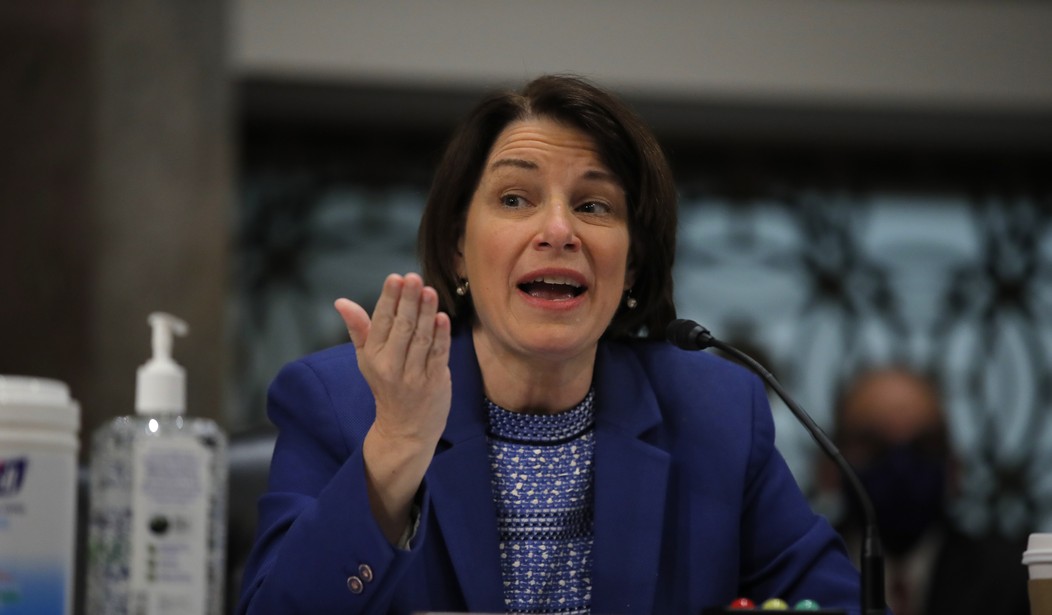America is facing a host of issues right now. Inflation is showing no signs of slowing down which is devaluing the paycheck of every American citizen. Further, the country is still experiencing a host of supply chain issues stemming from the global effects of COVID-19 lockdowns from the last two years. This has culminated in a concerning shortage of baby formula in the United States, leaving many young families in dire straits. Lawmakers in Washington are scrambling for solutions for the baby formula problem.
Sen. Amy Klobuchar (D-Minn.) offered her solution to the baby formula crisis on Twitter last weekend, saying, “To prevent shortages like these from happening again, we need to get to the root of the problem. We have to modernize antitrust laws.” Klobuchar would follow up that take shortly thereafter with this, “Monopolies and duopolies are causing shortages. Multinational shipping conglomerates and Big Tech companies are making it harder for small businesses to compete.”
At this point, one would be forced to ask what “Big Tech” could possibly have to do with a baby formula shortage. The short answer is: nothing at all. The longer answer is that Klobuchar is trying to gin up support in Washington for her antitrust proposal targeted against Big Tech. Her proposal, the American Innovation and Competition Online (AICO) Act, would prevent companies from utilizing their own services and bar them (in many cases) from keeping third party software off their devices. The legislation has raised a number of economic and cybersecurity concerns.
In Washington, when all you have is a hammer, everything begins to look like a nail. Klobuchar is now trying to turn her antitrust crusade to the broader economy, somehow trying to link it to the baby formula shortage being experienced by many families across the country. While it may strike a chord for some and might do well to cynically garner attention for Klobuchar’s personal political agenda, it ought to be seen for what it is – utter cynical nonsense.
Recommended
The immediate causes of the shortage come because of a recall due to safety concerns and the closure of one of America’s major formula factories. These realities would cause broader issues regardless of real or perceived consolidation in the formula market. Other factors include the fact that the market is limited to infants and birth rates in the U.S. are steadily declining.
If policymakers like Klobuchar are wondering why the shortage has not been able to be assuaged with any efficiency, they ought to look squarely in the mirror. Whatever consolidation exists in that market and the shortages the country is expected to face going forward are problems created by the United States federal government.
According to Jae Kim, a pediatric neonatologist at the Cincinnati Children’s Hospital, formula in the U.S. is “highly regulated.” Kim followed, saying, “I would consider this a barrier for new companies trying to compete both in the past and now.”
Kim’s observations are an understatement at best. The FDA has higher standards for approval and labeling of baby formula than those that are imposed by regulators in the European Union. This makes formula more difficult to make it to market in the U.S. and makes it almost impossible to import objectively safe formula from abroad. And, the formula that is able to come from overseas is subject to heavy tariffs.
Sen. Mike Lee (R-Utah) correctly noted the root of the issue, “American babies are going hungry and the federal government is standing in the way. Current policies, tariffs, quotas, bans, and regulations are preventing mothers and fathers from being able to make the best choices to feed their babies.”
In short, formula cannot come to market because of government regulations and intervention in the market. When shortages exist at home, those same regulations prevent formula from coming to U.S. shores. Despite all of this, the proposed solutions from lawmakers like Sen. Klobuchar are to create more government regulations and interventions in the formula market. It would be comical if it weren’t so sad.
Whether it’s baby formula manufacturers, social media companies, or smart phone providers, regulations and the looming presence of government increase the costs of doing business. As those obstacles mount, the market reaches a point where only big, entrenched actors can afford to stay in business.
The solution is not to go after the market harder, trying reckless solutions to break up big companies, which run the risk of price hikes and further shortages. Government-created problems cannot be solved with government solutions. Instead, the government – and those lawmakers that comprise it – should strongly consider stepping out of the way.
























Join the conversation as a VIP Member